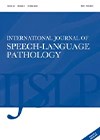Latest Contribution
Feel what you say: a framework to demonstrate the emotional response to aphasia is intertwined with the emotional toll
The authors start this paper by flagging a recent study demonstrating that speech and language therapists in clinical practice rarely have time to focus on emotional issues in relation to aphasia. Yet, people with aphasia describe the close relationship between...
How much does it cost to simulate speech and language therapy placements?
The Royal College of Speech and Language Therapists report that 20% of speech and language therapy positions are unfilled in the UK. Consequently, there is an urgent need to offer as many training courses as possible to fill these gaps....
Parkinson’s humour: recognising social communication difficulties
Parkinson’s results in a progressive motor disease with symptoms including tremor, rigidity and bradykinesia. However, people with Parkinson’s also experience non-motor symptoms such as cognitive difficulties that can impact social communication, often due to their co-existing speech difficulties, auditory and...





